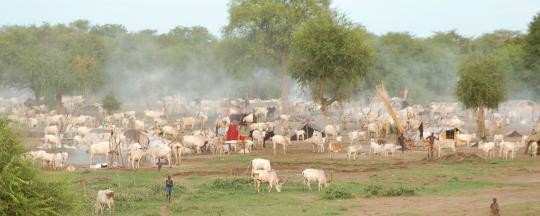A contingent of the South Sudanese army loyal to Salva Kiir (SPLA-Juba) is in Mundri East County, Western Equatoria, in response to a call by local authorities to escort a group of migrant herders away from the area toward Yirol West County, Lakes State.
Mundri East Commissioner Lexton Mabruk said the pastoralists moved to the area to avoid cattle raiding in Lakes state and in search of good pastures.
But the local authorities say the presence of the herders sparked tensions with local farmers, resulting in the recent killing of one person and several cattle.
Matur Ayual, head of the cattle camp in Amadi area, Mundri East County, Western Equatoria state confirmed on Wednesday that he was in discussion with troops of the SPLA-Juba faction to escort them out of the territory of Western Equatoria.
“The army has been sent to us and we are holding discussions with them. They say we should leave the area and they will provide escort up to somewhere after Mvolo County. We do not refuse, but we requested them to give us some time to prepare because some of the cows are sick,” said the pastoralist leader.
He said that they need some time to search for medicines for the cattle because it will not be easy to find them once they travel back to Lakes State.
Ayual also explained that the negotiations with the army follow clashes in which more than 20 cows were allegedly killed in separate incidents, after disputes over encroachment of the cattle into areas designated by locals for cultivation.
The soldiers were asked to intervene on the grounds that local and state authorities are perceived as not being neutral in the disputes with the locals, whereas the soldiers have more potential influence over the herders.
According to Ayual, “Every time there is an issue between us and the people in the area, the authorities do not give themselves time to understand the actual root cause and address.
“The county authorities always label us aggressors and call for return. They do not care to look at the issues we raise dispassionately and apportion blame fairly,” he alleged.
The nomad said they always do not receive explanation for the killing of their cows.
“Our herd is our life because to every nomad life is worthless without cattle. What do you expect from us when our source of existence is threatened? The encroachment of grazing fields and routes by the local people is always a call for war. They close the passageway, saying they want to plant crops in it but the real intention is to deny the cow the path,” he claimed.
Such clashes have been increasing in frequency as pasturelands are dwindling. Nomads say they are finding it difficult to move freely in areas predominantly inhabited by peasants.
“Wherever we turn we find that pasture area is taken over by farmers. It becomes difficult for our herd to move and graze without veering into crops,” said Ayual.
“Once that happens, the farmers confront us and we have no option than to justify,” he said.
Lakes and Western Equatoria have repeatedly formed farmer-nomad reconciliation committees in various areas to try to resolve misunderstandings. In this case, however, the army has also been called in.
Related coverage:
Tension between villagers and herders in Mundri West (7 Aug.)
Cattle keepers leave Maridi County (12 July)
Chiefs at Mundri want herders to leave by mid-July (25 June)




